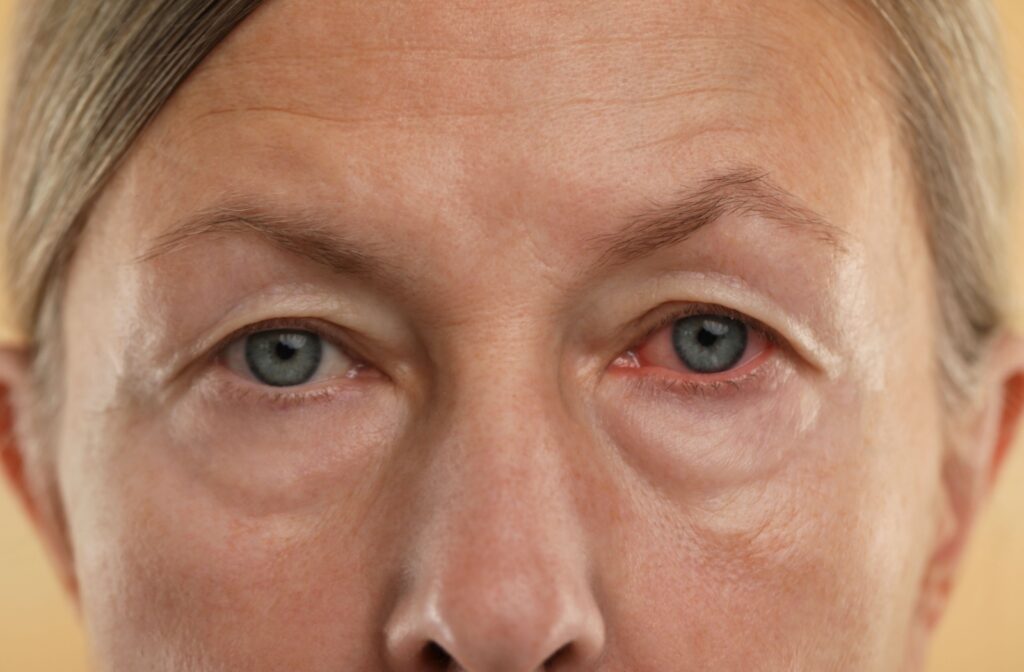Scratching your eye can be both uncomfortable and concerning. When this happens, the best immediate response is to rinse the eye gently with clean water or saline, avoid rubbing it, and consult a healthcare provider if pain, redness, or vision disturbances persist. Acting quickly can reduce the risk of infection and support proper healing.
Whether the injury results from a pet’s claw, a speck of debris, or an accidental poke, knowing how to handle the situation can safeguard your vision. Recognizing the signs of a scratched eye, understanding appropriate at-home care, and knowing when to seek emergency treatment from your optometrist are all key to preventing complications and preserving eye health.
What Is a Scratched Eye (Corneal Abrasion)?
A scratched eye, also called a corneal abrasion, is an injury to the cornea—the clear, protective layer covering the front of your eye. The cornea is highly sensitive, so even minor scratches can cause significant discomfort and disrupt vision.
Common causes of corneal abrasions include:
- Accidental pokes to the eye (e.g., from a finger or makeup brush)
- Rubbing the eyes excessively, especially with debris present
- Contact lens misuse or extended wear
- Getting sand, dust, or small particles in the eye
- Pet claws or playful pets brushing against your face
- Tree branches or plants brushing against your eye while outdoors
Since the cornea is essential for focusing light, any damage to it can affect vision clarity and increase the risk of infection. That’s why prompt action is crucial.
Symptoms of a Scratched Eye
Recognizing the symptoms of a corneal abrasion can help you determine the severity of the injury and decide whether professional care is necessary. Common signs include:
- Eye pain: Discomfort can range from mild irritation to sharp pain, especially when blinking.
- Redness: The white part of the eye may appear inflamed.
- Watery eyes: Your eye may tear up excessively as a natural response to the injury.
- Light sensitivity: Bright light may cause discomfort or worsen pain.
- Blurred vision: The scratch may temporarily affect your ability to see clearly.
- Foreign body sensation: You may feel like something is stuck in your eye, even after rinsing it.
Immediate Steps to Take After Scratching Your Eye
If you suspect you’ve scratched your eye, your first instinct might be to rub it—but rubbing your eye can worsen the injury and increase the risk of infection. Instead, follow these steps:
Rinse Your Eye
Gently flush your eye with sterile saline solution, clean water, or eyewash. This can help remove any debris and reduce irritation. Avoid using tap water if possible, as it can contain bacteria.
Avoid Rubbing or Touching Your Eye
Although it’s tempting, rubbing your eye can deepen the scratch and introduce bacteria. Resist the urge to touch your eye, and avoid applying pressure.
Blink Frequently
Blinking helps stimulate tear production, which can naturally rinse the eye and remove small particles. This natural cleansing process can help reduce irritation and promote the eye’s healing.
Remove Contact Lenses
If you wear contact lenses, take them out immediately. Contacts can trap debris and bacteria, slowing healing and increasing the risk of infection. Avoid wearing them again until your eye has fully healed and a healthcare professional gives you the go-ahead.
Apply a Cool Compress
Using a clean, damp cloth, apply a cool compress to the affected eye to reduce swelling and relieve discomfort. Ensure the cloth is clean to prevent infection.

What Not to Do After Scratching Your Eye
Certain actions can worsen the condition of a scratched eye. Avoid the following:
- Do not rub your eye. This is the most common mistake and can deepen the abrasion.
- Avoid redness-relief eye drops. These are not designed for treating corneal abrasions and may irritate your eye further.
- Do not attempt to remove objects from your eye with cotton swabs, tweezers, or fingers. This can worsen the scratch.
- Do not patch your eye unless instructed by a medical professional. Covering the eye can trap bacteria and lead to infection.
When to Seek Medical Attention
While minor scratches often heal on their own, you should seek medical care if:
- Pain persists beyond 24 to 48 hours.
- Vision becomes blurry or worsens.
- Light sensitivity becomes severe.
- You notice discharge from the eye.
- The sensation of something in your eye continues after rinsing.
Ignoring persistent symptoms can lead to complications such as infections, corneal ulcers, or long-term vision issues.
Medical Treatments for a Scratched Eye
If you visit an eye care professional, they may recommend the following treatments, depending on the severity of your abrasion:
- Antibiotic eye drops or ointments: Prevent infection and aid healing. A healthcare provider will prescribe the appropriate type and dosage.
- Lubricating eye drops: Artificial tears keep the eye hydrated and reduce irritation. Non-prescription, preservative-free options are often recommended for sensitive eyes.
- Pain relief drops: For severe discomfort, a doctor may provide medicated drops to relieve pain and reduce inflammation.
- Follow-up appointments: For more severe abrasions, your provider may schedule a follow-up visit to ensure proper healing and rule out complications.
Recovery Timeline
Most minor corneal abrasions heal within 24 to 48 hours, but deeper scratches may take up to a week or longer. During recovery, it’s important to:
- Avoid wearing contact lenses until your provider says it’s safe.
- Limit screen time to reduce eye strain.
- Wear sunglasses outdoors to protect against light sensitivity and debris.
- Avoid environments with dust, wind, or smoke.
If symptoms persist beyond a few days, schedule a follow-up examination.
Preventing Future Eye Scratches
While accidents happen, you can reduce your risk of corneal abrasions by following these preventive measures:
- Wear protective eyewear during activities like yard work, sports, or home repairs.
- Handle contact lenses properly—wash your hands before inserting them, avoid sleeping in them, and replace them as directed.
- Exercise caution around pets and small children.
- Avoid rubbing your eyes if you feel irritation; instead, rinse them gently.
Protecting Your Vision With Expert Care
Scratching your eye can be uncomfortable and alarming, but taking immediate action—flushing the eye, avoiding contact lenses, and seeking professional care when necessary—can support proper healing and prevent complications.
If you experience ongoing discomfort, blurred vision, or signs of infection after scratching your eye, Total Vision in Novato, CA, is here to help. Our experienced eye care team can evaluate your injury, provide effective treatment, and ensure your vision remains clear and healthy.
Contact Total Vision today to schedule an appointment or learn more about protecting your eye health.




